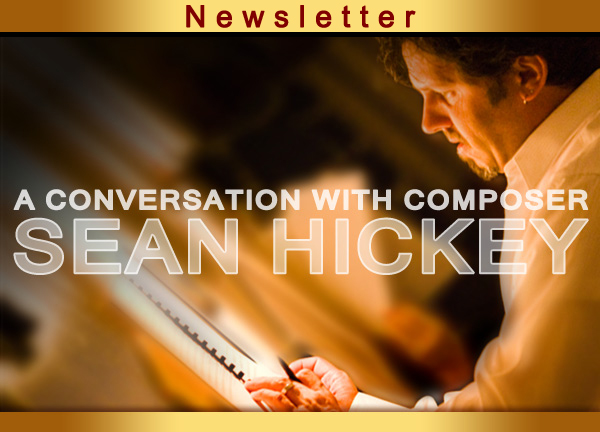|
Last month Pierre R. Schwob, the founder of Classical Archives, called me and said, “You really should listen to music written by a young American composer named Sean Hickey. You can find some on Classical Archives.”
I followed Pierre’s advice. The first piece of Sean’s that I listened to was Left at the Fork in the Road, a composition for flute, clarinet and bassoon. I realized immediately that I was hearing music of extraordinarily high quality. As I listened to more of his works, I realized that Sean’s music was taking me somewhere completely new. I discovered a composer whose works are humorous, accessible (in the best sense of the word), meticulously crafted, fulfilling, and genuinely important.
Here are some excerpts from a recent conversation that I had with Sean.
Barry Lenson: The bio on your website states that you started out as a jazz guitarist. Now you have composed a large body of remarkably beautiful and complex works for various chamber ensembles, singers, piano, and even full-blown concertos for solo instruments and orchestra. How did all that happen?
Sean Hickey: I grew up playing the guitar from age 12 and studied jazz in college, first at Oakland University and then at Wayne State University for two and half years, before switching to composition. During that time, I got to meet and spend time with a lot of my fellow students. I was a decent improviser and a horrible sight-reader – and still am – while my colleagues often had the opposite problem (if you could call it that). I began by writing short works for solo instruments and grew away a bit from performing in general as well as jazz. I was in a successful band and, between regional touring and composing works, I gave a bit less time to practicing guitar. By the time I switched to Wayne State, I became a composition major, studying primarily with James Hartway and James Lentini. Both were tremendous teachers and are extremely talented composers. Both deserve to be better known. I kept studying jazz guitar with Steve Carryer through college.
Barry: How does the idea of a piece come to you, and how does that idea develop?
Sean: I must say there is generally no formula. Often a title of a piece happens to come first, or sometimes a general shape presents itself to me. But more often than not, I struggle with staring at the blank page and feeling miserable. But many of my works begin with a simple gesture and that gesture, shape or cell often pervades a piece, or a movement of a piece, for a long time. Left at the Fork in the Road, the first movement of my Clarinet Concerto, Pied-a-terre, Cursive, Avatar and several works were born that way.
I generally find the process slow, methodical and tough to reconcile with my desire to complete a meaningful piece of music. But at some point – and this almost always happens – I find a breakthrough and can often finish a movement or piece in a matter of evenings, writing pages and trying to discard some of which seems to be too much of a good thing: inspiration I suppose. I don’t know. That’s a thrilling time of course, and often one when I function on a bit less sleep.
Of course, I tinker for a long time afterward, at the piano and at the computer, and have to draw the line somewhere and be content with a work being done. I tallied up the places in which I worked on a large orchestral piece over a period of two years. It added up to some twenty cities on two continents. Here’s to hoping that it all holds together.
Barry: Can you pick one of your compositions and share its story – how it happened?
Sean: They all have a different story of course, but I would share the story of a work premiered in 2014 for piano quintet, titled Terroir. Commissioned by the astounding pianist, Xiayin Wang and the legendary Fine Arts Quartet (with financial support from International Performing Artists), the three-movement piece is in many ways one of my more traditional works, and in my opinion my best. I was giving a brief lecture to the composition class at my alma mater, Wayne State University, and asked if I could borrow a piano for an hour of work. I shut off my phone, took a look out the window at wintry Detroit, and came up with the line and the two alternating chords, sketching out most of that movement in that hour, and making fairly concrete plans for the other two. The entire piece took five months to write and the premiere at New York’s Merkin Hall went off beautifully.
Barry: Some of your compositions have humorous titles like “Pair of Pants.” What role does humor play in your compositions?
Sean: Well, humor is something that I find missing in a lot of concert music, and some of my titles may be light but the substance I hope is not. I do like a title to sometimes be a bit provocative – some people look for a political statement in Left at the Fork – and sometimes a title comes to me first actually, perhaps governing the material to some degree, which may have an element of play or frivolity. Then again, I have three concertos – for cello, clarinet and mandolin – that are concertos in name with no extra-musical titles nor associations.
I’m especially drawn to the phenomena of the natural world, and some of my titles – Scree, Dolmen, and my recent symphony, Olympus Mons – all draw upon life’s mysteries as inspiration. The last takes as its departure the tallest known mountain in our solar system, Olympus Mons on Mars. It is so large that it creates its own weather systems that affect a large portion of the planet, and so tall yet sloped so gradual that, standing on top of it, one wouldn’t feel as if atop a mountain. All of what I describe here informs the architecture of the entire piece, as well as most of the material.
Barry: One of your compositions, Sagesse, is a setting of a poem by Verlaine. Why did you select that text? Are there other poets or writers whose words you admire and that you would like to set?
Sean: Sagesse was commissioned by Sung Jin Hong and the One World Symphony in 2004 and premiered in that year. He asked for a work for vocal soloists and orchestra and I worked to find a suitable text. I had been drawn to French Symbolist poetry in translation, without ever studying it or truly understanding it deeply. Sagesse seemed to lend itself to the piece I wanted to write and later record, and I’ve since discovered that the poem has been set literally hundreds of times in several languages.
I have been a writer longer than I’ve been a composer, and published a book of poetry – Banyan Tree – in 1995. I have to say that I don’t find setting text dutifully to be all that difficult, but doing so with imagination is another matter entirely. To me, great poetry should be read or heard, not sung. I know that’s sacrilege to a lot of music fans, singers and composers. I feel I could set poetry conceived in that way, for music, but so much is just not suitable for me. I could list a hundred poets whose work I love – Yeats, Heaney, Mahon, Neruda, Levine, Dickinson, Szymborska – but I can’t imagine tackling their verse.
Barry: Was there a time or a moment or a listening experience that sparked your desire to become a composer?
Sean: I can point to one experience very clearly and I was 15. My parents took me from Detroit to Chicago in what may have been one of my first trips to a large city. Though weaned on rock and studying the electric guitar for years, I could not have been prepared for the life-altering event of experiencing the tremendous sound of the Chicago Symphony Orchestra under George Solti. Stravinsky’s Symphonies of Wind Instruments, to this day one of my favorite pieces, opened the concert. The vision of a stage only one-third full and absent strings was a bizarre one that I recall today. More bizarre was the blocky, amelodic piece that created an overwhelming impression in its sonorities, its strange formlessness and lack of development, sort of a musical block of clay, but of course minutely honed by the fastidious master. Somewhere around intermission I became a composer.
Barry: Even in your orchestral works, individual instruments and groups of instruments are so easy to hear as they have their say. It’s pretty magical. Can you give any insights into how you do that?
Sean: I can try and I’m very grateful to hear you say that, since I’m always concerned with line. Even in my more constructivist and cubist works – such as the first movement of my Clarinet Concerto, Cursive, Avatar – I want to ensure that each instrumental line is meaningful in its own right. I’ve composed a lot of works for solo melody instruments, especially in my twenties, and I’ve found it to be very helpful in creating a cogent piece of implied harmony and melodic meaning.
I do like the chamber music quality of some orchestral music – Shostakovich’s First Symphony is a fine example – and I’ve tried to incorporate spare textures into my orchestral music, reserving a full tutti for rare moments.
Barry: Is there a genre of music that would like to write that you haven’t already?
Sean: In college I wrote a couple of big band charts, one of which was an arrangement of a Frank Zappa song. Though I don’t have much interest in writing for the jazz idiom per se, I’d very much like to write for that combination of instruments. Even more attractive would be to write for wind band. I’ve long wanted to, but just never found the opportunity. And I would very much like to write another string quartet for a group willing to bring a piece to life.
Barry: What is next for you?
Sean: In my role as VP, Sales and Business Development for Naxos of America, I am always doing all I can to promote my recordings, including Cursive, as well as tens of thousands of others in a changing environment. I have just fulfilled a new commission for the Whatcom Symphony Orchestra, led by their dynamic music director Yaniv Attar and based in Washington State.
I am honored to be commissioned by the best-known and most incredible recorder virtuoso in the world, Michala Petri. I will compose a concerto for her and wind orchestra that will have its premiere in Copenhagen in 2016 at the Royal Danish Conservatory. I spent a week there this fall preparing for the commission and working with Michala on understanding the instrument. I’m also looking to have the West Coast premiere of Terroir sometime in 2015, and I’m pleased to see some performances in Brazil and South Korea of my some of my chamber works. And if I’m persistent, I will persuade pianist Philip Edward Fisher to place a work of mine – which he has recorded, on a program in the UK at some point this year. And I also hope to write a short work for another wonderfully gifted pianist, Klara Min.
Barry: I am so happy to have gotten to know you, and your works have taken me to some very new places. Thank you very much.
Sean: Thank you too.
|







